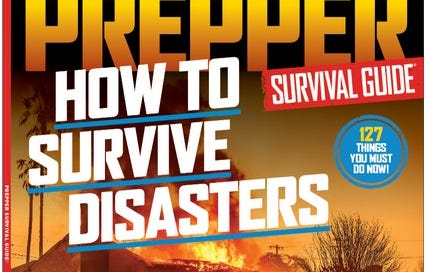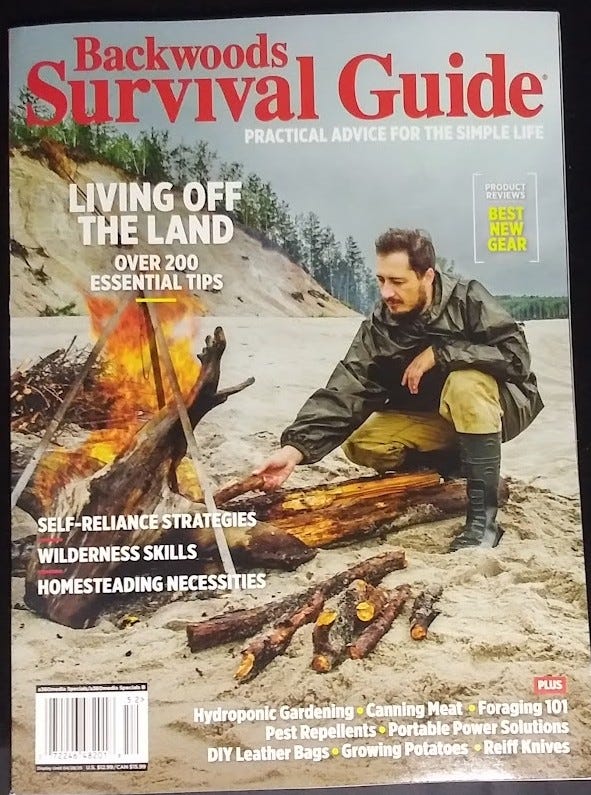Hey folks, thanks for checking out the newsletter. The big news this week is the release of the new Prepper Survival Guide special issue. It has shipped from the printer and should be showing up in stores everywhere. You’ll be able to find it anywhere magazines are sold. If you can’t seem to find it anywhere, or you just plain don’t want to go shopping, you can order it here online.
I’d love to hear what you think of the issue once you’ve had a chance to read it through!
* * *
This is one of the easiest preps to do and it has multiple uses. Fill clean plastic bottles, like those from soda or juice, with clean water. Leave a couple of inches of head space. Close them up and put them in the freezer. Here’s what this will do for you.
1) A full freezer is more efficient than one with a lot of empty space. Thus, it saves a bit on your power bill.
2) In a power outage, a full freezer will stay frozen for upwards of 48 hours. The more dead space in it, the shorter that time frame will be.
3) This is a dandy way to store extra water for emergencies.
4) If you need to keep food in a cooler, whether you’re going on a fun trip or you’re evacuating, you can use the frozen bottles like ice packs.
* * *
We recorded the last episode of How to Survive 2025 today. Brian, Dacia, and I had a blast doing this show. I’m hopeful that people got a lot out of it. The final episode will go live next week. You can get caught up here or wherever you normally get your podcasts.
* * *
Developing a survival mindset is important. Here’s a quick overview of some of the ways to get your head in the game.
* * *
I feel that an important focus for state- and county-level emergency management should be what I call Ground Level Preparedness. Some EMs are doing this already, many more seem interested but aren’t sure how to start. What I mean by Ground Level Preparedness is working on educating the public about individual and family disaster readiness. This should go beyond simply sharing snazzy graphics in September for National Preparedness Month.
There are tons of budget-friendly ways to foster and grow preparedness interest in your communities. I’m happy to help.
* * *
Take time today to make a list of things that you love and appreciate about each member of your family. Put that list somewhere safe. If you end up in a stressful extended grid down emergency, you can reread the list to remember why you don’t truly hate these people.
* * *
Here’s the official flyer for the preparedness expo I’m putting together with Walworth County Emergency Management.
* * *
We ended up at the Delavan Memorial Arboretum in Delavan, Wisconsin for our hike over the weekend. We wanted something relatively short as we were taking the mutts with us. Daisy is getting on in years and while she loves walks, she doesn’t have the stamina for long hauls anymore. What you’re seeing here is actually a lake bed. The city is doing some work on part of the shoreline, so they drained the lake.
Survival Tip – Stockpiling Prescription Medications
This one comes up a lot, so I wanted to rerun the essay I wrote some time back.
For good or ill, we are a nation of pill poppers. Modern pharmaceuticals have helped us to control a wide range of ailments, and more and more people require them to stay on the green side of the grass. The problem is building up an emergency supply, just in case running to Walgreens isn’t an option.
There is no one-size-fits-all solution to this struggle, but there are a few different approaches you can consider trying.
1) Talk to your prescribing doctor. Explain that you’re concerned about running out of vital medications during any sort of extended emergency, such as severe weather that essentially confines you to your home for a few days or more. If the medication in question is not a narcotic, you might convince them to prescribe an additional supply. It never hurts to ask. One drawback with this approach is that you might need to pay out of pocket for the medication if your insurance company won’t cover the secondary prescription.
2) This approach takes a little longer, but it has no appreciable impact on your wallet. Build up your supply over time, by taking advantage of any overlap between refills. For example, let’s say you have a medication you take once a day, every day. You receive a prescription for 30 pills, and you can refill at day 27. On day 27, you get your refill, and set aside 3 pills for your emergency supply. The next month, you get your refill again on day 27. This time, you set aside 6 pills for your emergency supply, but you take the original 3 and use them as you normally would. Next month, refill at day 27 and set aside 9 pills, using the other 6 as normal. And so on and so on. The idea here is to always use the oldest medication first, and to never skip a dose. Over time, you’ll be able to build up a substantial supply.
3) Travel to another country. This isn’t a viable option for everyone, but for those who are close to the southern border, making a trip to a pharmacy in Mexico might be worth your time. I’ve not done this myself, but I’ve been told by multiple people that many medications that in the United States require a prescription can be purchased over the counter there. They can also legally be brought across the border back home. I know a few people who make this an annual or semi-annual vacation. They don’t sell all medications over the counter, so do a little homework before taking the trip.
Assuming there are no specifically recommended storage requirements for the medication, keep it in a dark, cool, dry location. Always keep it in a properly marked prescription bottle, so there is no confusion as to what the medication is or who it is for.
Backwoods Survival Guide Magazine
For those new to my little corner of the Internet, I am the Editor in Chief for Backwoods Survival Guide magazine. Here is the cover for the current issue available in stores right now.
You can find Backwoods Survival Guide just about anywhere magazines are sold, including:
Walmart
Sam's Club
Costco
Publix
Walgreens
Rite Aid
CVS
Tractor Supply
Fleet Farm
Barnes & Noble
Subscriptions are available here.
Questions, Comments, Complaints, Concerns?
I am always just an email away - jim@survivalweekly.com.







Excellent advice, as always! I'm writing a short article for the local paper on how to prepared in terms of our pets and livestock in the case of a natural disaster. It's important to think about these things and have systems in place, long before we might need them. Thanks a bunch!